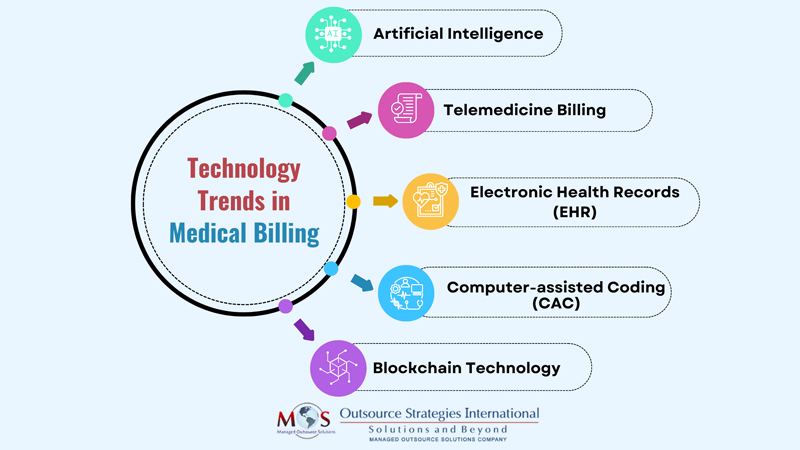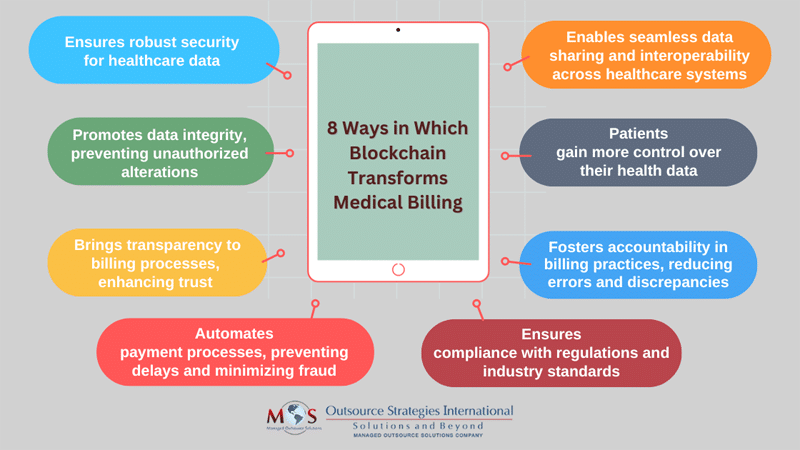Technology plays a key role in modernizing and optimizing the field of medical billing, streamlining processes, and improving overall efficiency. Ranging from Electronic Health Records (EHR) to specialized healthcare billing software, artificial intelligence and machine learning technologies, there are advanced tools available now to enhance the efficiency of medical billing processes, contributing to faster reimbursement cycles and improved financial management for healthcare providers.
7 Key Benefits of Technology in Medical Billing
- Efficiency and time savings
- Accuracy in coding
- Electronic claims submission
- Improved revenue cycle management
- Error reduction
- Enhanced data security
- Real-time eligibility verification


OSI is up-to-date with the latest technology in medical billing.
Speak to our experts at (800) 670-2809
Medical Billing Technology Trends
From automated coding to electronic claims submission, technology is revolutionizing every aspect of the billing process. Artificial Intelligence or AI in medical billing plays a significant role in enhancing accuracy in coding, claims processing, and predictive analytics for revenue cycle management. Additionally, the integration of blockchain technology is revolutionizing the security, transparency, and efficiency of revenue cycle management processes.
Artificial Intelligence
AI-driven software rapidly processes extensive datasets, uncovering patterns that human billers might overlook. The outcome is a decrease in human errors and heightened precision in claims, translating to expedited reimbursements for healthcare providers.

Enjoyed this article?
Let us also take a look at the role of AI and automation in healthcare billing.
Key ways in which AI is impacting and enhancing medical billing processes include the following:
- Automation of billing tasks: AI automates coding and claims submission, reducing errors and speeding up the billing process.
- Accuracy and compliance: AI ensures accurate coding, reduces errors in claims, and improves compliance with billing regulations.
- Claims processing: AI streamlines workflows, identifies issues, and facilitates faster adjudication, leading to quicker reimbursements.
- Predictive analytics: AI analyzes historical data to anticipate revenue cycle issues and optimize billing processes.
- Denial management: AI tools analyze denial patterns, identify root causes, and improve claims acceptance rates.
- Natural language processing (NLP): NLP extracts information from clinical notes for accurate coding, eliminating manual data entry.
- Fraud detection: AI detects unusual billing patterns, contributing to fraud prevention and maintaining billing integrity.
- Patient eligibility verification: AI enables real-time verification of insurance eligibility, reducing claim rejections.
Customized AI solutions can adapt to the unique billing requirements of different specialties and providers, ensuring a more personalized and efficient billing process.
Telemedicine Billing
Telemedicine billing is a significant trend, reflecting the growing adoption of telehealth services. Specific coding and comprehensive documentation are crucial for accurate telemedicine billing. Insurance providers are also expanding coverage for telehealth services, necessitating updated billing guidelines awareness. Ongoing regulatory changes impact telemedicine billing, requiring compliance and adaptation to new guidelines. Different telehealth modalities, such as video visits and remote monitoring, have distinct billing requirements. It is crucial for billing systems to adapt to efficiently process claims from virtual visits on telehealth platforms.
Electronic Health Records (EHR)
Electronic Health Records (EHR) streamline patient information management, enhancing efficiency in billing processes. EHR integration in billing improves accuracy, reduces errors, and accelerates reimbursement cycles for healthcare providers. This seamless synergy between EHR and healthcare billing contributes to a more effective and streamlined healthcare administration.
Role of Electronic Health Records (EHR) in Medical Billing
- Efficient data access: EHR systems enable quick access to comprehensive patient data, supporting accurate coding and billing processes.
- Automation of billing processes: Integration with EHR automates billing workflows, reducing manual efforts and minimizing errors in coding and claims submission.
- Real-time patient information: Billing staff can access real-time patient information, ensuring billing accuracy and reducing delays in claims processing.
- Improved documentation: EHR systems enhance documentation accuracy, providing detailed records that support transparent and efficient claim submission.
- Enhanced communication: Smooth communication between healthcare providers and billing professionals is facilitated through EHR, ensuring clarity in coding and billing practices.
- Streamlined revenue cycle: EHR contributes to a streamlined revenue cycle by providing a centralized platform for managing patient information, billing, and claims.
- Integration with coding systems: EHR systems often integrate with coding systems, ensuring that billed services accurately reflect the provided healthcare services.
- Patient engagement and billing transparency: EHR systems can incorporate patient engagement features, enhancing transparency in billing processes and providing patients with accessible billing information.
- Adaptability to billing changes: EHR systems can be adapted to accommodate changes in billing practices and regulations, ensuring ongoing compliance and efficiency.
Computer-assisted Coding (CAC)
Computer-assisted coding (CAC) is a technology-driven process in the healthcare industry that uses computer algorithms and natural language processing (NLP) to assist medical coders and healthcare providers in assigning appropriate billing codes to clinical documentation. CAC systems analyze electronic health records (EHR), transcriptions, and other medical documents to identify and suggest relevant codes based on the patient’s diagnosis, procedures performed, and other relevant information. Integrating medical billing software for efficiency is a strategic move. This software streamlines billing tasks, including claims submission and processing, reducing manual errors and accelerating reimbursement cycles. By seamlessly integrating with other healthcare systems, it ensures a more cohesive and automated approach to medical billing, ultimately improving overall operational efficiency.
Blockchain Technology
Blockchain technology revolutionizes healthcare billing by enhancing security, transparency, and efficiency. Key roles include ensuring enhanced security through its tamper-proof system, promoting data integrity with immutability, and providing transparency in billing processes.
Smart contracts automate payment processes, preventing delays and fraud. Blockchain enables interoperability, patient control over data, and accountability in billing. It simplifies auditability, ensuring compliance, and has the potential to reduce administrative costs in medical billing.
Data Security Measures in Technology-Driven Billing
Data security is a paramount concern in technology-driven billing, and several measures can be implemented to safeguard sensitive patient information. Encryption protocols are employed to protect data during transmission, ensuring secure communication channels between healthcare providers and billing entities. Robust access controls and authentication mechanisms are implemented to restrict unauthorized access to patient records, and regular security audits are conducted to identify and address potential vulnerabilities in the documentation system.
By consistently updating our systems and adopting cutting-edge technologies, OSI empowers healthcare organizations to navigate the complexities of modern billing seamlessly. Our proactive approach allows practices to streamline their billing workflows, minimize errors, and maximize revenue.


Revolutionize your healthcare documentation process! Discover the difference with our comprehensive medical billing services.
Call (800) 670-2809!






